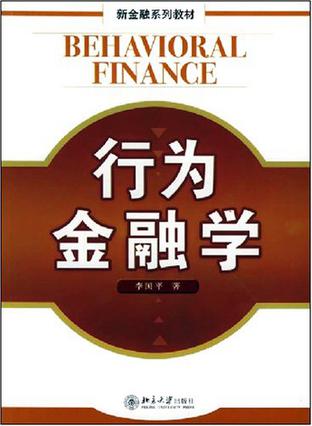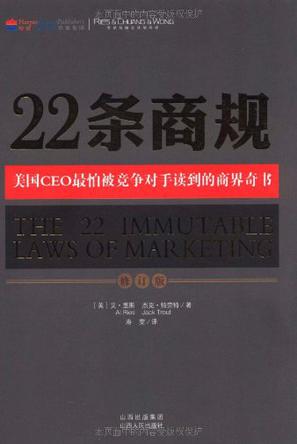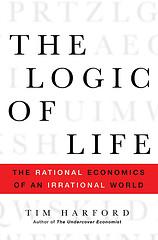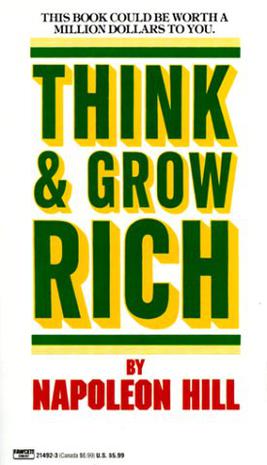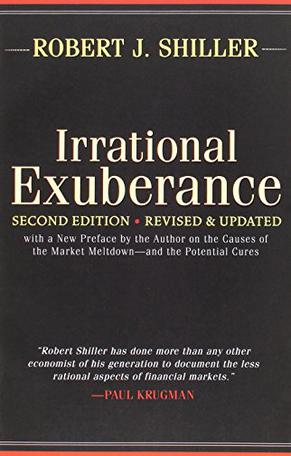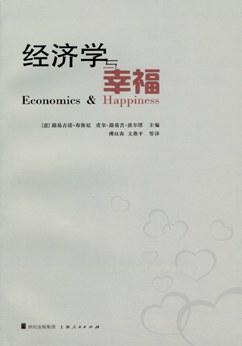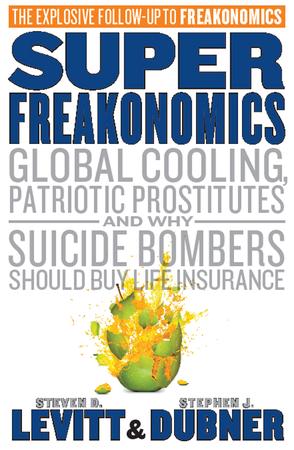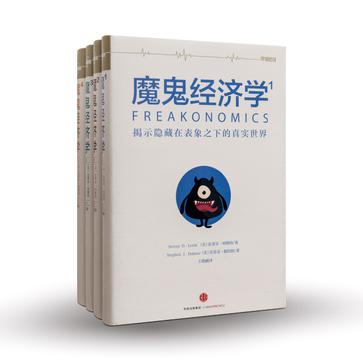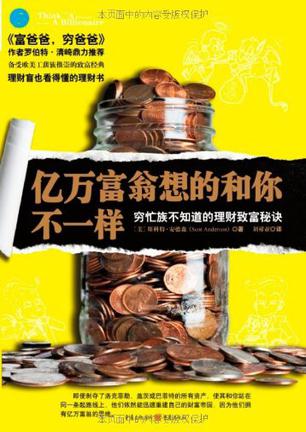欢迎来到相识电子书!
标签:经济
-
生活水准
本书是1998年诺贝尔经济学奖获得者阿马蒂亚·森于1987年发表的一部重要论著,它构成了阿马蒂亚·森的福利经济学和发展经济学研究的一个重要环节。全书讨论的核心问题,是我们究竟应当怎样来看待“生活水准”这个经济学的基本概念,亦即怎样刻画“生活水准”或给它下定义的问题。围绕着这一核心问题,阿马蒂亚·森和其他一些英国学者在本书中对“生活水准”进行了深入的探讨,包括阿马蒂亚·森的两次特纳讲演,剑桥大学和埃塞克斯大学的四位知名学者约翰·米尔鲍尔、拉维·坎伯、基思·哈特、伯纳德·威廉斯的评论,以及阿马蒂亚·森的答复。 -
生活中的博弈论
善博弈者为赢而玩,就算把他丢到海里,他也能衔条鱼爬上来;就算天塌下来。他也能捞只天鹅。为赢而玩决非“不择手段地求赢”。从博弈论的观点看,有时候输赢不过是同一硬币的两面。 只要是MBA或是在大学主修经济的人,几乎都会在课程上正式接触到博弈理论,不懂博弈理论的人在和这些人过招时,难免会屈居下风。生活由一局又一局的博弈所组成,你我皆在其中不遗余力地争取高分。本书详细介绍了生活中的博弈论。此外,本书还将以精彩的案例和智力游戏题挑战你的智商,为你揭示生活中种种诡异的悖论。 “博弈”一词听起来玄而又玄,说白了就是“游戏”的意思。如果需要更准确点的说法,就是有输有赢的游戏。可以说,博弈论(Game Theory)是通过“玩游戏”而获得的人生竞争知识的理论。 博弈就是游戏,那么游戏又是什么呢? 从某种意义上来说,游戏是对生活的抽象与概括,是一种简化的人生模型。 比如象棋,有这样几种角色:老将、相、士、车、马、炮和小卒子,俨然一支军队。当然,比起真实的人生,这个模型过于简单了,但是一样可以映射出现实的生活。而且,惟其简略,那些被纷繁表象所掩盖的道理才更加明了。 争强好胜是人的天性,这是人们痴迷于各种对抗性游戏或赌局最根本的原因。 博弈论原意为游戏理论。这一理论涉及的“游戏”范围甚广:人际关系的互动、球赛或麻将的出招、股市的投资等等,都可以用博弈论巧妙地解释,可以说,红尘俗世,莫不博弈。 博弈论探讨的就是聪明又自利的“局中人”如何采取行动及与对手互动。人生是由一局又一局的博弈所组成,你我皆在其中竞相争取高分。 -
非理性繁荣(第二版)
本书开辟了一个新的领域,以一种更加清晰和彻底的方式向我们展示了那些可能动摇经济运行和严重影响人们生活的市场泡沫的产生和破灭。在第一版中,希勒教授曾经成功地预言了股市的下跌,而在本书中,他将研究扩展到了目前炙手可热的房地产市场,用了一章的篇幅来论述美国国内和国际房价的历史走势。 希勒教授通过大量的证据来说明,如同20世纪90年代末的股市,目前房地产市场的繁荣中隐含着大量的泡沫,并且最终房价可能在未来的几年中开始下跌。他认为,2000年股市泡沫破灭之后,许多投资者将资金投向房地产市场,这使得美国乃至世界各地的房地产价格均出现了不同程度的上涨。因此,非理性繁荣非没有消失,只是在另一个市场中再次出现。 希勒教授认为,最终摆脱这种困境的途径在于社会制度的改进,比如进一步完善社会保障制度,增加保险品种以保障人们的收入和住房,以及更加分散化的投资选择。 -
行为金融学
《行为金融学》第一部分介绍金融泡沫、股市的季节等传统金融学难以解释的金融市场异常现象。第二部分介绍套利及其有限性理论、关于信念与偏好的心理学理论、羊群行为以及有投资性等行为金融学理论。第三部分 运用上述行为金融学理论解释个人投资者、机构投资者以及公司领导者在金融市场中的决策行为。 -
22条商规
《22条商规:美国CEO最怕被竞争对手读到的商界奇书》是美国著名作家阿尔.里斯先生和杰克.特劳特集20多年经验。这本《22条商规:美国CEO最怕被竞争对手读到的商界奇书》里所提到的营销定律并不随时代和环境的变迁而改变。战术或许一直在变,但是好的战略从未改变,在20世纪70年代、80年代和90年代都奏效的战略,在21世纪的今天也同样奏效。正如中国古代哲学家老子所言,“独立而不改,周行而不殆”。 点击链接进入英文版: The 22 Immutable Laws of Marketing: Violate Them at Your Own Risk! -
大泡沫
泡沫,比如20世纪20年代和90年代的股市泡沫,是现代经济生活令人深恶痛绝的特征。美国的投资者一次又一次受到快钱、新技术和过度乐观情绪的引诱而头脑发热。当泡沫破灭时,他们一次又一次证明着自己的愚蠢。因此,金融史也是一部梦想破灭和痛苦反思的悲剧史。 但这是故事的全部吗?现在回顾起来,泡沫是否也有它积极的作用?这种疯狂的经济狂热是否也为机遇、增长和创新打下了基础?泡沫能成为经济的一个有利因素吗? 在本书中,丹尼尔•格罗斯从大量事实中得出了一个令人信服的观点:所有的泡沫都有积极作用。从19世纪的电报狂潮到当今美国对于可替代能源的狂热,从铁路到房地产,格罗斯带我们回顾了这些大胆投资者和先锋所带来的旋风,分析了它们所留下的宝贵财富,从中我们可以看到,通常被认为是灾难的泡沫实际上曾经帮助人们建立了商业基础设施,从而推动了经济的增长。泡沫其实也是重大的科技和商业创新时代中迅速扭转经济的一种方式。可以说,打击金融泡沫并且成功走出阴霾的能力也是经济的韧性和繁荣的秘诀之一。 -
The Logic of Life
http://www.timharford.com/logicoflife/ “Life often seems to defy logic. When a prostitute agrees to unprotected sex, or a teenage criminal embarks on a burglary, or a smoker lights another cigarette, we seem to be a million miles from what we would call rational behaviour. None of this makes sense – or does it? Tim Harford thinks it does. And by weaving stories from locations as diverse as a Las Vegas casino and a Soho speed-date together with insights from an ingenious new breed of economist, he aims to persuade you that we are all, in fact, surprisingly logical. Reading this book, you’ll discover that the unlikeliest of people – racists, drug addicts, revolutionaries and rats – comply with economic logic, always taking account of future costs and benefits, even if they don’t quite realise it. It even explains why your boss is overpaid…” -
Think and Grow Rich
在线阅读本书 Book Description Here are money-making secets that can change your life. Inspired by Andrew Carnegie's magic formula for success, this book will teach you the secrets that will bring you a fortune. It will show you not only what to do but how to do it. Once you learn and apply the simple, basic techniques revealed here, you will have mastered the secret of true and lasting success. And you may have whatever you want in life. 点击链接进入中文版: 思考致富 -
行为经济学:理论与应用
2002年度令人瞩目的诺贝尔经济学奖授予了行为经济学的代表人物丹尼尔·卡尼曼(Daniel Kahnema)和弗农·史密斯(Vernon L.Smith)教授。这在经济学界引起巨大的震动。行为经济学这一既传承了经典经济学主线,又向传统经济学提出新的理论挑战的新领域,引起了国内学者的密切关注。 本书是目前我国首部系统介绍行为经济学的理论脉络、发展轨迹与延伸、应用前景及与我们日常生活的关系等内容的著作。全书共十一章,分为行为经济学的理论与行为经济学的应用两部分,本书适合广大经济理论工作者及高校师生使用。 -
简单的博弈论
《简单的博弈论:创造最佳决策的技术》是博弈论日本第一人梶井厚志教你轻松学习博弈论的最佳入门书,教你轻松搞懂博弈论,体验胸有成竹、胜券在握的快意战略决策。作者梶井厚志运用经济中的博弈论思想对生活中的事例进行了通俗易懂的分析。作者颠覆传统博弈论的数理倾向,以博弈论阐述何谓策略性思考,并说明通过策略思考可以理解哪些事物,是轻松学习博弈论的最佳入门书。作者梶井厚志将复杂、艰涩的理论寓于大量的日常生活案例,不论是商务谈判,还是购物、男女联欢会中座位的顺序等,我们都处在与他人的行动不断交织在一起的环境当中,在这个过程中,确立自己的战略并且执行至关重要。 -
Irrational Exuberance
《非理性繁荣》书名取自美国联邦准备理事会理事主席葛林史班 1996 年底在华府希尔顿饭店演讲中,谈到当时美国金融资产价格泡沫时所引用的一句名言。从那时起,许多学者、专家都注意到美国股市因投机风气过盛而引发的投资泡沫现象。 Book Description In this timely and prescient update of his celebrated 2000 bestseller, Robert Shiller returns to the topic that gained him international fame: market volatility. Having predicted the stock market collapse that began just one month after the first edition was published, he now expands the book to cover other markets that have become volatile, particularly the recently red-hot housing market. He includes a full chapter on domestic and international housing prices in historical perspective. Shiller amasses impressive evidence to support his argument that the recent housing market boom bears many similarities to the stock market bubble of the late 1990s, and may eventually be followed by declining home prices for years to come. After stocks plummeted when the bubble burst in 2000, investors moved their money into housing. This precipitated the inflated real estate prices not only in America but around the world, Shiller maintains. Hence, irrational exuberance did not disappear—it merely reappeared in other settings. Building on the original edition, Shiller draws out the psychological origins of volatility in financial markets, this time folding real estate into his analysis. He broadens the evidence that investing in capital markets of all kinds in the modern free-market economy is inherently unstable—subject to the profoundly human influences captured in Alan Greenspan’s now-famous phrase, “irrational exuberance.” As was true of its predecessor, the second edition of Irrational Exuberance is destined to be widely read, discussed, and debated. Amazon.com CNBC, day trading, the Motley Fool, Silicon Investor--not since the 1920s has there been such an intense fascination with the U.S. stock market. For an increasing number of Americans, logging on to Yahoo! Finance is a habit more precious than that morning cup of joe (as thousands of SBUX and YHOO shareholders know too well). Yet while the market continues to go higher, many of us can't get Alan Greenspan's famous line out of our heads. In Irrational Exuberance, Yale economics professor Robert J. Shiller examines this public fascination with stocks and sees a combination of factors that have driven stocks higher, including the rise of the Internet, 401(k) plans, increased coverage by the popular media of financial news, overly optimistic cheerleading by analysts and other pundits, the decline of inflation, and the rise of the mutual fund industry. He writes: "Perceived long-term risk is down.... Emotions and heightened attention to the market create a desire to get into the game. Such is irrational exuberance today in the United States." By history's yardstick, Shiller believes this market is grossly overvalued, and the factors that have conspired to create and amplify this event--the baby-boom effect, the public infatuation with the Internet, and media interest--will most certainly abate. He fears that too many individuals and institutions have come to view stocks as their only investment vehicle, and that investors should consider looking beyond stocks as a way to diversify and hedge against the inevitable downturn. This is a serious and well-researched book that should read like a Stephen King novel to anyone who has staked his or her future on the market's continued success. --Harry C. Edwards From The New Yorker During the past decade, he has emerged as a leader in the new field of "behavioral finance" which seeks to apply lessons learned from other academic disciplines, particularly psychology to economics. Irrational Exuberance is not just a prophecy of doom. Encompassing history, sociology, and biology, as well as psychology and economics, it is a serious attempt to explain how speculative bubbles come about and how they sustain themselves. John Cassidy From Library Journal Taking his book's title and thesis from Alan Greenspan's 1996 description of investors, Shiller (economics, Yale Univ.) studies the current booming U.S. stock market in historical terms. His research into past U.S. and international markets indicates that during every speculative bubble there was always widespread consensus that high valuations were justified by each market's special circumstances. Every large market correction seemed to result from popular consensus rather than specific events or news. Shiller says that past bull and bear markets, though often based initially on sound fundamental reasoning, fed upon themselves to go beyond what the facts justified. He challenges the efficient market theory, demonstrating that markets cannot be explained historically by the movement of company earnings or dividends. He concludes that the current U.S. stock market is a speculative bubble awaiting correction. While the book certainly belongs in all academic business collections, public libraries should also purchase it as a counterweight to the plethora of get-rich-quick investment guides. -Lawrence R. Maxted, Gannon Univ., Erie, PA From The New York Times Book Review No one has explored the strange behavior of the American investor in the 1990's with more authority, or better timing, than Robert J. Shiller. Louis Uchitelle About Author Robert J. Shiller is the Stanley B. Resor Professor of Economics at Yale University. He is the recipient of the 2000 Commonfund Prize, awarded for Best Contribution to Endowment Management Research, for Irrational Exuberance. He is also the author of Market Volatility and Macro Markets, which won the 1996 Paul A. Samuelson Award. Book Dimension : length: (cm)23.3 width:(cm)15.4 -
生活中的行为经济学(下)
《生活中的行为经济学(下)》内容简介:每个人每天都在面临选择和决策,但这些选择并非全都是“理性”的,恰恰相反,人们过去的经验、满足的假想、不精确的参照系等因素的影响,时常会做出有损最大利益的“非理性”选择。行为经济学更深地洞悉了人们思维深处的奥秘,指出生活中“荒唐”决策的本质,探究非理性行为的规律,这也是为什么这些年诺贝尔经济学奖会连续授给行为经济学家的原因。 人们很多看似荒诞的经济行为,其实背后都有一只“看不见的手”在操纵,它无时无刻不在影响着我们的生活。比起亚当·斯密那只著名的“看不见的手”,这只手更加敏感、细腻,带着浓浓的人情味儿。研究人的行为规律,本来就是经济学永恒不变的主题,所以。行为经济学跟每个人相关,跟每个企业相关。它有时候像那个说出皇帝没有穿衣服的孩子,虽然道明了真相,但是人在面对真相的时候多少有点尴尬。 《生活中的行为经济学(下)》深入浅出地分析个人的日常经济行为(包括投资决策)以及商家的营销策略,让人不仅看到普遍实例中非理性的思维根源,更有触类旁通的联想和分析,让自己成为更为聪明的消费者和投资者。 《生活中的行为经济学(下)》分上下两册,本册主要解析人的日常消费行为中的误区,下册主要解析行为博弈、时间偏好,金融市场的“奇异现象”以及个人投资决策行为。 -
经济学与幸福
本书所收13篇论文均来自在意大利米兰-比可卡大学召开的“经济学中的幸福悖论”国际会议。会议有两个主题:其一是对幸福概念的界定,其二是从更深层次探索“幸福悖论”背后的因素。 本书最大特点是紧扣幸福研究的复杂性,汇集不同学科(经济学、哲学、心理学、社会学、伦理学等)对幸福的研究成果。它们之中,既有哲学思辨的推理与判断,也有数学的精确测量与计算;既有不同国别的横向比较,也有同一国家不同时期的纵向比较;既有对经济思想发展脉络的回顾,也有从相关学科不同视角的新解释。 对幸福研究有兴趣的师生学者,对提升幸福指数有责任的企业家和政府官员,以及关心自己和自家幸福的普通百姓,将从本书获益匪浅。 -
Super Freakonomics
The New York Times best-selling Freakonomics was a worldwide sensation, selling over four million copies in thirty-five languages and changing the way we look at the world. Now, Steven D. Levitt and Stephen J. Dubner return with SuperFreakonomics, and fans and newcomers alike will find that the freakquel is even bolder, funnier, and more surprising than the first. Four years in the making, SuperFreakonomics asks not only the tough questions, but the unexpected ones: What's more dangerous, driving drunk or walking drunk? Why is chemotherapy prescribed so often if it's so ineffective? Can a sex change boost your salary? SuperFreakonomics challenges the way we think all over again, exploring the hidden side of everything with such questions as: How is a street prostitute like a department-store Santa? Why are doctors so bad at washing their hands? How much good do car seats do? What's the best way to catch a terrorist? Did TV cause a rise in crime? What do hurricanes, heart attacks, and highway deaths have in common? Are people hard-wired for altruism or selfishness? Can eating kangaroo save the planet? Which adds more value: a pimp or a Realtor? Levitt and Dubner mix smart thinking and great storytelling like no one else, whether investigating a solution to global warming or explaining why the price of oral sex has fallen so drastically. By examining how people respond to incentives, they show the world for what it really is – good, bad, ugly, and, in the final analysis, super freaky. Freakonomics has been imitated many times over – but only now, with SuperFreakonomics, has it met its match. -
亿万富翁想的和你不一样
《富爸爸,穷爸爸》作者罗伯特•清崎 鼎力推荐 备受欧美工薪族推崇的致富经典 理财盲也看得懂的理财书 即使剥夺了洛克菲勒、盖茨或巴菲特的所有财产,让他们和你站在同一个起跑线上,他们依然能迅速重建自己的财富帝国——因为他们拥有亿万富翁思维。 亿万富翁箴言: 失败并非终局——请有意识地提高你的挫折商 坚持每个月读两本书——知识是开启财富大门的钥匙 时间是我最大的一笔投资——它是我最珍贵的资产 失败9次也没关系——只要再努力1次,说不定有千万美元进账 内容简介: 一名工薪族十年内成为亿万富翁的致富自白 洛克菲勒、比尔•盖茨、沃伦•巴菲特、唐纳德•特朗普…… 为什么他们可以成为亿万富翁? 亿万富翁和一般人有什么区别? 斯科特•安德森用自己的亲身经历证明:他们能成为亿万富翁是因为他们想的和你不一样! 想要像斯科特•安德森一样在一年之内就从一个“穷忙族”变成一名亿万富翁,你只需要“窃取”亿万富翁们的想法和思路就行——斯科特全面总结了以下七个“富翁思路”: 金钱 你总在盘算着如何花钱;亿万富翁却在思考如何用钱生钱 投资 你根本就没有投资的概念;亿万富翁则把投资看成致富关键 工作 你会固守一份工作;而亿万富翁知道:工作根本不可能让自己成为富翁,只有投资才会 风险 为了避免失败,你总想远离风险;亿万富翁却知道避免风险本身就意味着失败 问题 你总是尽量避免问题;亿万富翁却把问题看成是赚取万贯家财的大好机遇 知识 你总是临时抱佛脚;亿万富翁则在平时广泛汲取知识并最终厚积薄发 时间 你总在浪费时间;亿万富翁则把时间看成最珍贵的资产 -
36.5℃行为经济学
经济学教科书告诉我们,每个人都是理性的经济人,做出的一切决策和采取的一切行动都只围绕着一个目的:实现自我利益最大化。 然而现实生活并不总是可以准确计算的,凭估算或印象而做出决定似乎更符合人类的本性。沃伦•巴菲特将自己的巨额资产无偿捐献给需要帮助的人;银行设定了信用卡最低还款额,卡奴的卡债负担却越来越重;攒钱储蓄的决心常常被冲动购物的念头打垮;股票价格一跌再跌,股民们却选择继续持有而被套牢;政府出台的“利民”政策,效果经常大打折扣甚至适得其反…… 是传统经济学的假定前提错了吗?有着230年历史的行为经济学从人类的心理机制着手,通过一系列妙趣横生的实验,证明了我们并不是完美的“经济人”,有限理性、厌恶损失、有限意志力、有限自私、注重公平才是真实的人性。种种让传统经济学家匪夷所思的举动,行为经济学通通可以给予合理的解释。 较之传统经济学,行为经济学更贴近于现实生活。因此,作者称行为经济学为“拥有36.5摄氏度体温的经济学”。 -
我在黑道學會的88堂商管課
黑道幫派,是歷史最悠久的企業, 他們以獲利為目標,不受景氣影響,屹立不搖, 這些都有賴組織內各司其職,精實的菁英體系, 從小弟到老大,他們到底分別掌握了哪些做事原則? 「在我的腦海裡,隨便就能想到十幾個由仍然活躍,或已退隱的黑道分子經營的成功大型企業。他們的成就,全來自黑手黨培養出的悟性。」~本書作者路易斯.費倫特 路易斯.費倫特,曾隸屬美國五大黑手黨幫派的甘比諾犯罪家族。13歲開始負責偷竊,還沒20歲就擁幫眾成為一方角頭,不到25歲已是肩負百萬美元生意的菁英階層。 金盆洗手後的他發現,所謂的白道世界,有時比黑道更黑暗!而許多正當企業裡的員工與管理階層,做事不得法,無法發揮該有的戰鬥力。於是他將黑道所見行之有年的生存哲學,以及黑手黨菁英的領導術,整理成書。全書共有88個實用的工作法則,並且區分成三大部分: 第一部分: 給小弟的課(一般企業員工) 第二部分: 給堂主的課(中階主管) 第三部分: 給老大的課 (企業領導人) 其中黑色領導及工作哲學包含: *自己去買咖啡: 尊重指揮管理系統,但不要變成窩囊廢 *隔牆有耳: 為什麼絕不說主管壞話? *自己那口飯自己賺: 讓公司覺得僱用你是有利的 *為團隊負全責: 要體認所有的錯,都是你的錯 *黑道不記筆記: 鍛鍊你的記憶力吧! *不要自我分裂: 錯誤的決定比什麼都不決定好! *何時為老大擋子彈: 權衡短期犧牲與長期利益 -
消费者行为学
《消费者行为学》(原书第10版)是《消费者行为学》最新的第10版。全书共分为六大部分,第一部分导论,介绍了消费者行为的性质、在社会各方面尤其是营销领域的运用,阐明了消费者行为知识的意义与价值;第二部分讨论了消费者行为的外部影响因素;第三部分讨论消费者行为的内部影响因素;第四部分介绍消费者决策过程;第五部分讨论组织购买行为;第六部分集中审视和探讨消费者行为与市场营销规制方面的问题。第10版在各章增加了反映互联网发展的内容和实例,网上练习题也有所增加,增加了本教材的时代气息;“消费者透视”的内容做了很多调整和更新,增加了更多反映不同文化背景下消费者行为特点的实例;对原来的一些案例进行了替换和更新,课后习题也做了扩充。
热门标签
下载排行榜
- 1 梦的解析:最佳译本
- 2 李鸿章全传
- 3 淡定的智慧
- 4 心理操控术
- 5 哈佛口才课
- 6 俗世奇人
- 7 日瓦戈医生
- 8 笑死你的逻辑学
- 9 历史老师没教过的历史
- 10 1分钟和陌生人成为朋友




